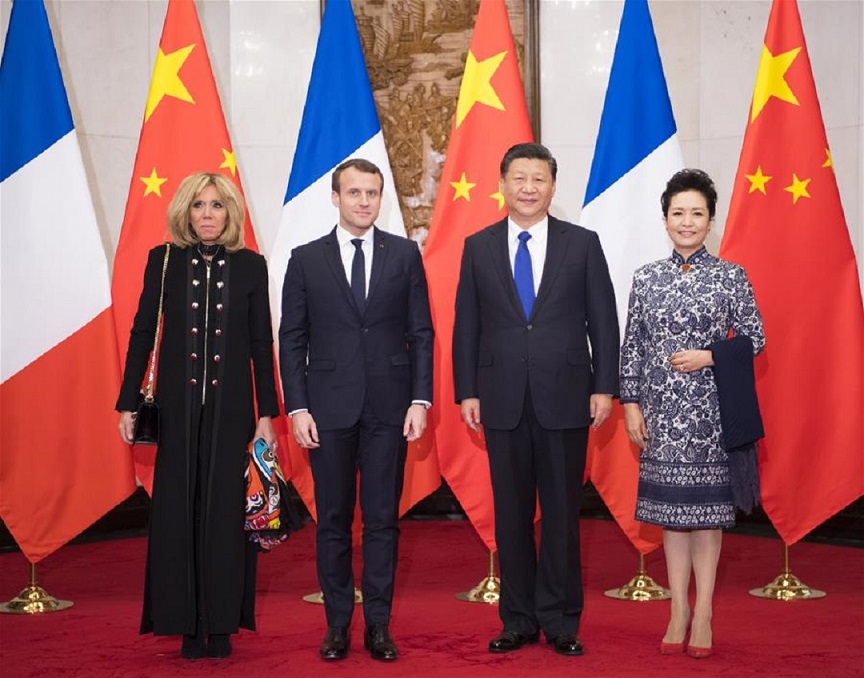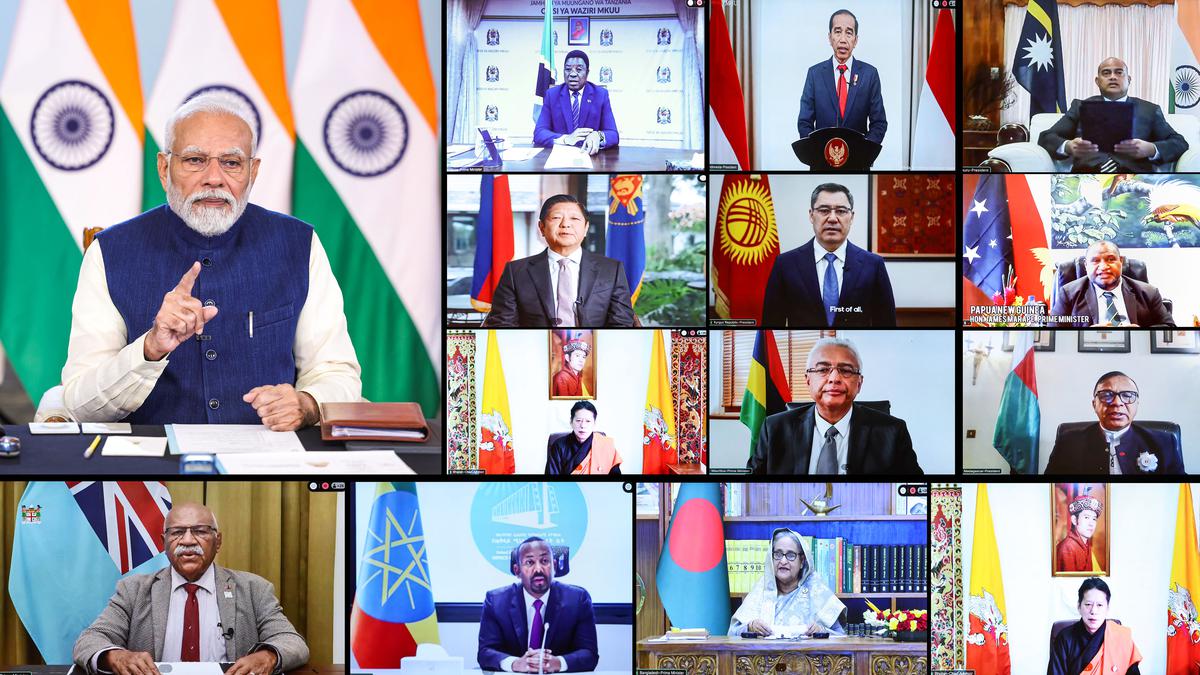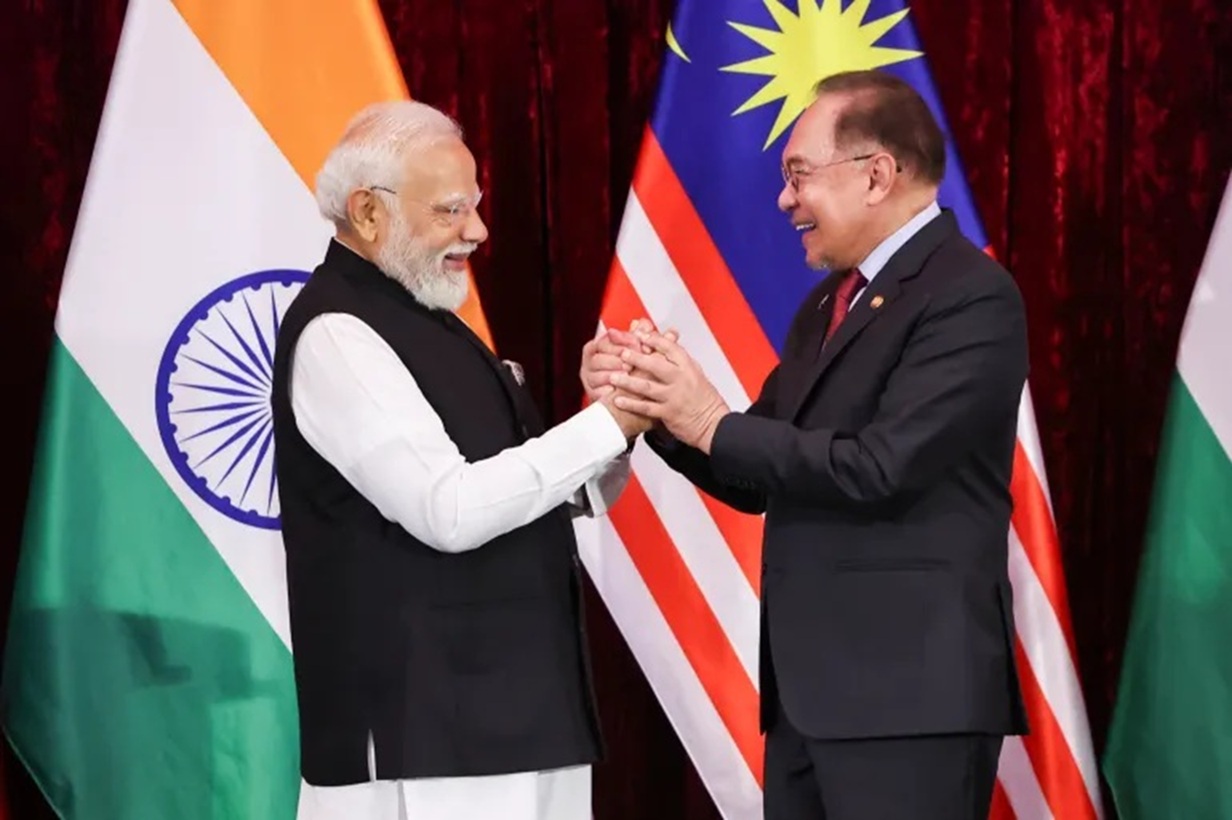The recent meeting between French President Macron and Chinese President Xi Jinping is under extensive scrutiny. The two-state leaders discussed the restoration of good bilateral relations. The French president’s main objective was to discuss Taïwan and the war in Ukraine. This article tries to establish the objectives of each party and tries to analyse the Chinese strategy.
France has a long diplomatic history with China. The stakes of this visit go beyond French interests, indeed, the issue of the Ukrainian conflict is added to the agenda.
Objectives of President Macron’s Visit
This visit redefines France’s modern diplomatic stakes toward China. The French president wanted to smoothen its relations with Beijing, sorely tried following the pandemic and has the “vague” position of Beijing in the Ukrainian file. It should be noted that President Macron’s visit follows the Chinese President’s trip to Moscow where he met Vladimir Putin and his delegation. The objectives of this meeting between the two leaders of the non-Western front are to intensify their relationship in unprecedented ways, economically and commercially, of primary and military resources. The leaders trusted their mutual relationship during the cold war and thereafter.
The major challenge of President Xi Jinping to Moscow was to sign a declaration by 2030 on the growing economy and power of the China-Russia coalition of countries. The aim is to defeat the dollar monopoly. A close trade with Russia gives Xi Jinping a certain mileage in international forums. China is against the use of atomic weapons in the conflict. To return to the interests of the French president’s visit to Beijing, they fall into two categories. The tangible objectives have a physical diplomatic manifestation. On top of that, there are intangible objectives. One of the intangible objectives is rather trivial, as the President has sought to re-establish diplomatic dialogue with Beijing since the pandemic. Moreover, China was fairly isolated in the months following the outbreak of the pandemic. The goal of restoring dialogue is critical to the successful restart of the economy and trade with China. The common objective of Franco-Chinese trade relations is to strengthen trade ties, a fairly European movement, and a large number of diplomatic visits have been made by heads of European states. Chancellor Scholtz has been there.
For China, Europe is a more than juicy market. The European Union has a trade deficit of $1 billion per day. The commercial aspect of the subject meeting was the facilitation of French entrepreneurs signing production and logistics agreements with China. Confirming the will of both countries to restore and intensify their trade partnerships. Let us re-context the vision of France and Europe for China.
On the one hand, France is the preferred country of the Chinese people, and also France has re-established relations with the People’s Republic of China, earlier than most democratic countries in those years. Recognizing China as the People’s Republic of China and not the island of Taiwan, reinforces the principle of one China. China’s strategy towards Europe is to present Europe as an alternative to the United States. In his diplomatic appeals quite often China through Wang Yi’s voice calls on Europeans to stand out from the United States and to have a vision of their own. The aim of this is to undermine America’s hegemonic Europe. Europe enjoys the right balance between the US and China at the time of the Ukrainian conflict to guarantee Europe’s interests. The joint declaration is without any legal authority because the French Republic as part of NATO’s military command must follow the US military guidelines. But in a sense, recent facts are quite consistent with China’s view. Furthermore, academic partnerships with China are expected to intensify, a positive thing in observing the decadence of France’s academic excellence in international rankings.
Few Challenges
Reaffirm France’s diplomatic axis, and dialogue.
- Intensify trade between France and China with the assistance of large companies.
- More academic partnerships with China, meeting the will of Chinese students.
- Confirm French hopes to have China’s word for relaxation in the Ukrainian conflict.
The Ukrainian Conflict
The French President might have told the President Xi of his ambition to have China as a voice of reason for President Putin. President Xi Jinping has returned from a visit to Russia, after ascertaining the proximity of the two leaders. The idea of China as a peacemaker is quite current, indeed a recent example is in favour of China, the diplomatic rapprochement between Saudi Arabia and Iran, two cultural, religious, and commercial enemy powers. In other older conflicts, China is gradually taking a mediator position as it is on the Korean issue. As an emerging economic power in the world, China has an increasing interest in the political and economic stability of the Euro-Asian region. The crisis in Ukraine and the continuing tensions between Ukraine and Russia have thus attracted China’s attention.
Although China initially preferred to remain neutral in the conflict, it began to take a position and took a more proactive approach because of its own interests in the region. First, China has important trade ties with Russia. As the world’s largest exporter of oil and natural gas, Russia is a key trading partner for China. China and Russia have also cooperated in major infrastructure projects such as the construction of energy pipelines and trade routes. The war in Ukraine and the Western economic sanctions against Russia have affected the Russian economy and consequently, the Chinese economy. As such, China has sought to support Russia in times of crisis. It continued to import oil and gas from Russia and took steps to strengthen trade ties between the two countries.
In addition, China has also sought to use the situation in Ukraine to expand its influence in the region. The conflict created an opening for China to strengthen its relations with the countries of the region, particularly in Central and Eastern Europe. China offered to mediate the conflict and offered its assistance for Ukraine’s economic reconstruction. In conclusion, the war in Ukraine is important to China because it has close economic ties with Russia, which is a key player in the conflict, and it is also seeking to expand its influence in the region. By acting as a mediator and providing economic assistance, China hopes to strengthen its relations with the countries of the region and play a greater role in regional affairs.
The conflict in Ukraine and Russia’s annexation of Crimea in 2014 had an impact on China’s perception of international relations, particularly with regard to its own Taiwan annexation scenario. China can see Russia’s strategy of claiming neighbouring territories as justification for its own territorial ambitions. However, the situation in Ukraine has also shown China the cost and complexity of territorial annexation, particularly in economic and diplomatic terms. The international sanctions imposed on Russia have had an impact on its economy and reduced its ability to act internationally. China may also have been deterred by international opposition to the annexation of Crimea and by the risks of military escalation in the region. China has a cautious view of foreign policy and often seeks to avoid direct confrontation. Ultimately, it is difficult to say how the conflict in Ukraine directly influenced China’s position on Taiwan. However, Russia’s approach to territorial annexations has certainly attracted China’s attention and may have had an impact on its long-term view of foreign policy.
A Strong Relationship
In November 2019, Emmanuel Macron, President of the French Republic, made an official visit to China. This three-day visit, the second since Macron became president in 2017, provided an opportunity for France to strengthen its relations with China, which is now a leading economic and trade partner. Relations between China and France have grown significantly in recent years, transforming their cooperation into a comprehensive strategic partnership and a dialogue on global economic, political, and security issues. During his visit to China, Macron brought together the commercial, cultural, educational, and technological sectors to strengthen cooperation between France and China. Macron met with Chinese President Xi Jinping, with whom he discussed various topics, including growing economic and trade tensions between China and the United States, as well as discussions on sustainable development and combating climate change. During his meeting with President Xi Jinping, Macron stressed the importance of the relationship between France and China, considering it a major bilateral relationship for France in Europe. Relations have evolved from a long tradition of friendly collaboration during the period of General de Gaulle to a working alliance made at the G20 Summit in Hangzhou in 2016.
France expressed interest in the new Chinese silk roads, a dream project by Xi Jinping to connect Asia to Europe via a multitude of rail, sea, and road lines. France, a major exporter of luxury goods, has become an important market for China in terms of foreign investment and tourism. Emmanuel Macron expressed his wish to see more Chinese tourists visiting France. He once supported China’s participation in the first China International Import Fair, held in Shanghai in November 2018, which attracted many French companies seeking export and cooperation opportunities. During the French President’s visit, several trade agreements were signed between France and China, ranging from wine and pork trade to educational and technological cooperation. France has also become the first G7 country to join the Asian Infrastructure Investment Bank (IAIB), a Xi Jinping initiative to finance infrastructure projects in Asia. In addition, China and France agreed to strengthen their scientific and technological cooperation, particularly in the area of innovation and research. French companies have become more attentive to Chinese markets, while China has increased its foreign direct investment (FDI) in France.
Human Rights
However, Macron’s visit to China also faced challenges, including the human rights issue. Human rights defenders and international organizations criticized Macron for his silence on human rights violations in China. Political tensions surrounding the situation in Hong Kong and the treatment of Uighurs in Xinjiang province were also raised during the visit. In addition, French companies expressed concern about the treatment of foreign firms in China, particularly with regard to technology transfers and intellectual property. French companies asked Macron to speak on this issue during his visit.
Conclusion
In the end, Macron’s visit to China strengthened trade and cultural ties between the two countries, while opening the way for closer cooperation in the future. France considers China an important trading partner and seeks to strengthen its relationship with the country. However, while China continues to face human rights and treatment problems for foreign enterprises, the question of how to reconcile trade and cultural relations with legitimate human rights concerns remains a critical issue for both countries.
Title image courtesy: Xinhuanet
Disclaimer: The views and opinions expressed by the author do not necessarily reflect the views of the Government of India and Defence Research and Studies
Références :
https://www.washingtonpost.com/world/2023/04/12/macron-taiwan-china-interview-trip/
https://www.washingtonpost.com/world/2023/04/06/macron-china-xi-ukraine-russia/
https://www.washingtonpost.com/world/2023/04/05/macron-beijing-china-trip-hedge-bets/
https://www.nytimes.com/2023/04/11/world/europe/macron-china-allies.html
https://www.nytimes.com/2023/04/07/world/asia/macron-xi-jinping-china-france.html
https://www.nytimes.com/2023/04/08/world/asia/macron-xi-france-china.html





